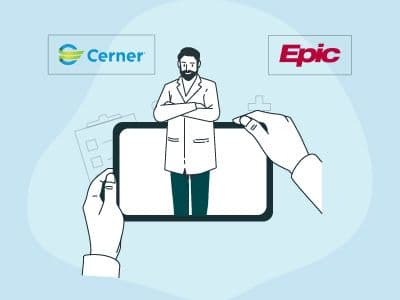athenaOne is a healthcare management platform offering integrated billing, scheduling, and EHR services. Its strengths include real-time claims management, automated appointment scheduling, and EHR integration for better care. Top alternatives include Epic, AdvancedMD, Nextgen, etc which also offer robust healthcare solutions with similar functionalities.
The Best athenaOne EHR Mobile App Alternatives
Select up to 2 products
Compare Features
Feature List | athenaOne EHR Mobile App |  Compulink Healthcare | NextGen Office EHR | AdvancedMD EHR |  RXNT |
|---|---|---|---|---|---|
Appointment Management/Scheduling | |||||
e-Prescriptions | |||||
Lab Integration | |||||
Patient Portal | |||||
Mobile App | |||||
Telemedicine | |||||
Billing and Invoicing | |||||
Claims Management | |||||
Customizable Forms | |||||
Patient Demographics |
Make decisions with real reviews from real users
In today's rapidly evolving healthcare environment, effective practice management and exceptional patient care are more important than ever. athenaOne has been a go-to solution for many, offering an integrated suite of tools that includes electronic health records (EHR), medical billing, and patient engagement tools. Designed to simplify administrative tasks and optimize financial operations, it’s widely used by healthcare providers across various specialties and sizes.
However, some practices may seek alternatives to athenaOne due to factors like limited customization options, integration hurdles, or specific feature gaps. Exploring other options may lead to better scalability, a more intuitive user experience, advanced automation, or specialized features that suit your practice. The right alternative can elevate your practice management.
To help you make an informed choice, we’ve crafted a list of the top 10 athenaOne alternatives, highlighting their key features, advantages, disadvantages, and pricing.
Our Best 10 athenaOne Alternatives Picks For Your Practice
Software | Unique Advantage | Notable Features |
NextGen Office EHR | Integrated clinical and billing system for streamlined workflows | Cloud-based accessibility Specialty-specific EHR templates |
AdvancedMD EHR | Highly customizable workflows and scalable features | Centralized billing dashboard Advanced financial reporting |
Epic EMR | Extensive interoperability for large healthcare systems | AI-driven analytics Real-time patient data sharing |
SimplePractice | Simplified interface designed for solo and small practices | Secure telehealth integration Automated appointment reminders |
DrChrono EHR | Mobile-friendly solution with extensive iOS compatibility | Customizable medical forms Integrated billing tools |
Tebra | Comprehensive marketing and practice management integration | Reputation management tools Patient communication |
InSync EHR | Specializes in behavioral health and rehabilitation practices | Custom treatment planning AI clinical documentation |
Cerner EMR | Enterprise-grade solution with robust data analytics | Population health management Advanced reporting features |
RXNT | All-in-one EHR and billing solution | Integrated e-prescribing Cloud storage |
Compulink Healthcare | Specialty-specific solutions with flexible configurations | Revenue cycle automation Customizable dashboards |
NextGen Office EHR
NextGen Office EHR is a cloud-based solution tailored to the unique needs of small to mid-sized medical practices. It offers a robust set of features, including specialty-specific EHR templates, an easy-to-use patient portal, and integrated revenue cycle management. It provides services to a wide range of specialties, such as primary care, pediatrics, cardiology, and others.
NextGen Office EHR stands out with its specialty-specific templates if we compare it to athenaOne. It enables the practices to customize clinical workflows and minimize documentation time. This tailored approach boosts efficiency and accuracy for the practices.
Some of its important features include:
- Remote Patient Monitoring
- Telehealth Tools
- Patient Feedback Surveys
- Analytics And Reports
What Are The Advantages And Disadvantages Of NextGen Office EHR?
Advantages | Disadvantages |
Provides excellent interoperability for workflow optimization Allows the patients to view their health records to stay updated Helps in handling multiple office location operations | Limited specialty areas Some users have highlighted its occasional inability to automatically pull up claims |
How Much Does NextGen Office EHR Cost?
It offers module-based quotes as per practice requirements.
AdvancedMD EHR
AdvancedMD EHR is a flexible, cloud-based healthcare platform that combines EHR, practice management, and medical billing services. It helps in customizing workflows, allowing practices to tailor templates and processes to fit their unique operational needs. Also, it offers scalability and adaptability for growing practices. The wide variety of specialties it caters to includes family medicine, internal medicine, mental health, and others.
In comparison to athenaOne, AdvancedMD provides greater flexibility with its customizable workflows to design processes that align with specific clinical and administrative needs. This adaptability promotes smoother operations and boosts staff productivity.
The key features are:
- Revenue Cycle Management
- Analytics And Reporting
- Self-Scheduling Tools
- Appointment Reminders
What Are The Advantages And Disadvantages Of AdvancedMD EHR?
Advantages | Disadvantages |
Provides advanced scheduling options, enhancing accuracy Users have appreciated its e-prescribing tools Facilitates internal team communication to boost patient care | Some users have highlighted issues with integrations May require time to set up customized templates |
How Much Does AdvancedMD EHR Cost?
The vendor offers personalized quotes based on the medical facility's needs.
Epic EMR
Epic EMR is a powerful, enterprise-level electronic medical record (EMR) system trusted by large hospitals, academic institutions, and integrated healthcare networks. Renowned for its advanced data management, it offers a broad spectrum of features, including patient scheduling, clinical documentation, and sophisticated billing solutions. Its patient portal boosts engagement by providing real-time access to medical records and appointment scheduling.
Epic EMR excels in interoperability, allowing seamless integration across various healthcare departments and systems. As compared to athenaOne, Epic EMR is considered strong enough to enhance data coordination, simplify workflows, and contribute to better patient outcomes.
Following are its key features:
- AI-Powered Charting
- Patient Monitoring Tools
- Built-in Voice Assistant
- E-Referrals
What Are The Advantages And Disadvantages Of Epic EMR?
Advantages | Disadvantages |
Provides a wide variety of integrations with authentication systems for enhanced security Eliminates the need for having multiple systems through its vast functionality Helps in accessing patient records easily | Limited mobile app functionality to access notes Some users have found the navigation challenging |
How Much Does Epic EMR Cost?
The vendor offers tailored pricing plans as per system requirements.
SimplePractice
SimplePractice is a cloud-based EHR and practice management solution designed for behavioral health professionals like therapists, counselors, and social workers. It also helps to simplify administrative tasks, allowing practitioners to prioritize client care. It also streamlines billing, invoicing, and insurance claim filing, while the client portal makes scheduling and document sharing hassle-free.
SimplePractice features an easy-to-use interface tailored for solo and small practices, making it easier to learn and navigate compared to athenaOne. This streamlines daily operations, ensuring smoother and more efficient practice management.
The notable features are:
- Customizable Intake Forms
- Treatment Plan Creator
- Virtual Health Tools
- Practice Website Builder
What Are the Advantages And Disadvantages Of SimplePractice?
Advantages | Disadvantages |
Allows the patient to access their information seamlessly Offers customizable templates Provides a detailed notes option | Lacks physical exam features Some users have reported minor issues with the telehealth functionality |
How Much Does SimplePractice Cost?
The vendor provides the following plans:
- Starter: Starting at $49/month
- Essential: Starting at $79/month
- Plus: Starting at $99/month
Disclaimer: The pricing is subject to change.
DrChrono EHR
DrChrono EHR is a versatile, cloud-based platform that combines EHR, practice management, and medical billing services, catering to diverse medical specialties. The platform supports telemedicine, patient scheduling, and a dedicated patient portal to enhance engagement. The overall flexible design and comprehensive features make it an ideal choice for practices of all sizes, such as multi-specialty clinics, hospital networks, and others.
DrChrono’s strong iOS compatibility and mobile-friendly interface offer healthcare providers the flexibility to manage patient care from multiple devices. This accessibility enhances responsiveness and convenience, giving it an edge over athenaOne in terms of mobile usability.
The note-worthy features are:
- Speech-To-Text Notetaking
- Automated SMS Reminders
- Payment Tools
- Denial Management
What Are The Advantages And Disadvantages Of DrChrono EHR?
Advantages | Disadvantages |
Helps in sending prescriptions to the patients for better care Allows the users to store reports Automates compliance, resulting in data safeguarding and security | May require training for initial understanding Some users have faced challenges with the medical billing tool |
How Much Does DrChrono EHR Cost?
It provides the following plans at customized pricing:
- Prometheus (EHR & Practice Management)
- Hippocrates (Advanced EHR & Practice Management)
- Apollo (EHR, Practice Management & Medical Billing Software)
- Apollo-Plus (EHR, Practice Management & Revenue Cycle Management Services)
Tebra (Formerly Kareo + PatientPop)
Tebra, born from the merger of Kareo and PatientPop, is an all-in-one healthcare technology platform designed to simplify practice management, boost patient engagement, and streamline revenue cycle management. The platform is built to optimize workflows for small to mid-sized practices offering specialties such as dental, urgent care, and others.
Tebra seamlessly integrates marketing and practice management tools, empowering healthcare providers to attract and retain more patients. It also helps providers expand their reach and build stronger patient relationships. This holistic approach makes it a stronger option for athenaOne.
Some of its essential features include:
- Online Scheduling
- Practice Marketing
- Clinical Documentation
- Eligibility Checks
What Are The Advantages And Disadvantages Of Tebra?
Advantages | Disadvantages |
Aids in uploading documents Helps in collecting patient reviews about the practice It is easy to navigate through the system | The automated messages may not always be received by the patient Lacks Google Calendar integration |
How Much Does Tebra Cost?
It provides flexible pricing plans that are based on the healthcare provider's preferences with regard to the system.
InSync EHR
InSync EHR is a cloud-based EHR system built to simplify clinical workflows and elevate patient care. It offers tools for customizable templates, telemedicine options, and integrated practice management tools. Designed to support specialties like behavioral health and primary care, it focuses on enhancing practice efficiency for small to medium-sized practices.
InSync EHR offers built-in telemedicine features, enabling providers to conduct virtual consultations without relying on third-party apps. This seamless integration creates a smoother experience for both healthcare professionals and patients. Hence, it can be considered as a great choice in place of athenaOne.
The key features are:
- Patient Portal
- Medication Management
- Automated Billing Process
- Remote Health Services
What Are The Advantages And Disadvantages Of InSync EHR?
Advantages | Disadvantages |
Offers comprehensive customization options Provides a wide range of reporting features for data projection Easy-to-use interface | Some users have faced issues with claim generation Setting up electronic faxing may be challenging |
How Much Does InSync EHR Cost?
It offers customized pricing quotes.
Cerner EMR
Cerner EMR is a robust EMR system trusted by major hospitals and healthcare organizations. It provides a wide range of features, such as clinical documentation, order management, and decision support tools. It also focuses on fostering better coordination and continuity of care.
Cerner EMR excels in interoperability, enabling smooth data sharing across diverse healthcare systems. This seamless integration helps reduce information gaps, making it especially valuable than athenaOne for large organizations managing multiple systems.
Following are its highly important features:
- Clinical Decision Support
- Voice Recognition
- Advanced Mobile Accessibility
- Health Analytics
What Are The Advantages And Disadvantages Of Cerner EMR?
Advantages | Disadvantages |
Helps in hassle-free appointment scheduling Covers daily clinical workflows, aiding medical professionals to focus on their patients Offer extensive functionality to store a large amount of patient data | May require several clicks to accomplish the tasks Charting can be made easier |
How Much Does Cerner EMR Cost?
The vendor offers tailored pricing.
RXNT
RXNT provides a cloud-based healthcare solution that combines EHR and practice management in one user-friendly platform. With a vast variety of features it is designed to streamline operations and enhance patient outcomes for healthcare practices. It is a specialized tool for small to mid-sized practices offering services for primary care, behavioral health, and others.
RXNT simplifies medication management with its integrated e-prescribing feature, enabling providers to manage prescriptions directly within the platform. This not only minimizes errors but also boosts patient safety, offering a smoother workflow compared to athenaOne's setup.
The key features are as follows:
- Prescription Management
- Charting Tools
- Claims Submission
- Telehealth Options
What Are The Advantages And Disadvantages Of RXNT?
Advantages | Disadvantages |
Makes it easy for clinicians to prefill medications Helps in boosting patient care Provides appointment scheduling tools | Some users have faced difficulties in deleting deceased patient records Limited billing features |
How Much Does RXNT Cost?
It offers the following pricing structure for personalized quotes:
- FS Bundle
- PM Bundle
- EHR Bundle
- ERX
Compulink Healthcare
Compulink Healthcare Solutions provides an all-in-one EHR system designed for a variety of medical care providers. It features customizable templates, revenue cycle management, and patient engagement tools, all aimed at streamlining operations and enhancing patient care through integrated solutions. It is best known for its offerings for small to mid-sized healthcare providers that offer specialties such as ophthalmology, optometry, and others.
Compulink’s specialty-focused solutions deliver customized functionalities that cater to the distinct needs of different medical fields. This tailored approach offers a more personalized experience compared to athenaOne’s broader features.
The most popular features include:
- Appointment Management
- Compliance Tracking
- Lab Integrations
- Patient Demographics
What Are The Advantages And Disadvantages Of Compulink Healthcare?
Advantages | Disadvantages |
Provides comprehensive support for system implementation Combines multiple EHR functionalities into one solution Generates flexible financial reports | Limited number of charts to work on at the same time Some users have reported challenges with web registration of patients |
How Much Does Compulink Healthcare Cost?
It offers custom pricing plans as per the requirements of the practices.
How We Choose Our athenaOne Alternatives?
To identify the best alternatives to athenaOne, a thorough and structured evaluation process was undertaken. Here’s how the top ten options were carefully selected:
This meticulous selection process ensures that the recommended alternatives are reliable, efficient, and well-suited to meet diverse healthcare practice needs.
Finding The Perfect athenaOne Alternative
Selecting the ideal alternative to athenaOne starts with understanding the unique needs and goals of your practice. Consider key factors like practice size, specialties served, and the complexity of your workflows. If your operations require flexible customization and scalable features, prioritize platforms that offer configurable templates and adaptable billing processes to boost efficiency. For practices focused on virtual care, selecting solutions with built-in telehealth features is essential for smooth and effective patient interactions.
Interoperability and integration are just as crucial. Look for platforms that easily connect with other healthcare systems to simplify data coordination, enhance decision-making, and reduce administrative tasks. It's also important to assess each option for ease of use, strong security protocols, and reliable customer support to ensure a smooth onboarding process and long-term success.
Ready to enhance your practice management and elevate patient care? Contact us today to explore these alternatives in-depth, test their features, and take advantage of demo opportunities.





